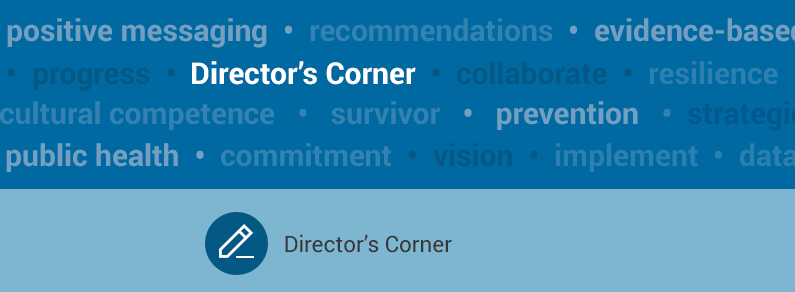Looking Past the Complexity
July 07, 2017

We often describe suicide as a complex problem that requires complex solutions. But sometimes a simple gesture can make a world of difference. The National Action Alliance for Suicide Prevention (Action Alliance) and its partners are coming together September 11 to 16 to inform the public about simple actions that can help save a life in their families, neighborhoods, schools, faith communities, and workplaces. We invite you to join us to help spread the word that everyone can take steps to prevent suicide, in honor of Suicide Prevention Month (September), National Suicide Prevention Week (September 11-17), and World Suicide Prevention Day (September 10).
Suicide is the result of complex interactions of risk factors. Preventing suicide at the population level—in a country, state, or community—requires a comprehensive and multi-sectoral approach. The Action Alliance exemplifies this approach by bringing together more than 250 organizations to champion suicide prevention as a national priority and advance the National Strategy for Suicide Prevention. One of the centerpieces of the work of the Action Alliance is Zero Suicide, a comprehensive approach that health care systems can use to improve the care of individuals at risk for suicide and make sure that no patient “falls through the cracks” and takes his or her life.
Health care systems—and the clinicians, nurses, pharmacists, and other professionals and paraprofessionals who work in them—are essential to our efforts to prevent suicide. But we should not look solely to these systems to “fix” a complex issue whose roots are found outside that system: in mental illness and substance use disorders, adverse childhood experiences that can affect an individual’s emotional well-being into adulthood, and the stress of trying to support a family in hard economic times. Suicide prevention is our collective responsibility. We all must work together to meet our national goal of reducing the rate of suicide 20 percent by the year 2025.
We know that reversing the 20-year trend of increasing suicide rates will not be simple. But there are simple actions that anyone can take to help family members, classmates, colleagues, and neighbors who are struggling with suicidal thoughts or the stresses that can lead to them.
A national poll found that almost 50 percent of American respondents identified barriers that stopped them from trying to help someone at risk for suicide. These included the fear that they would say or do something to make things worse rather than better, and not knowing how to find help for a person in crisis. To address these barriers, the Action Alliance and its partners will use September 11 to 16 to make the public aware of the simple steps anyone anywhere can take to be there for someone who is struggling or in crisis. We will leverage the good work of campaigns such as #BeThe1To, #BeThere, and Take 5 to Save Lives that focus on the importance of “being there” for others. We want to let people know that they can help prevent suicide by reaching out and supporting someone who is struggling or in crisis. Having someone who will listen can make a big difference. It’s not about fixing someone’s problems; it’s about being by someone’s side while they work through these problems and helping that person get help.
No special training is required to be there for someone in crisis. There are many ways that you can help someone feel less alone, less afraid, and less hopeless. These simple actions can save a person’s life. The simple actions of many can create a community of support that can encourage people in crisis to get the help they deserve.
Many of you work to prevent suicide every day. Please join us—the Action Alliance and its partners—to engage others in our cause and use September 11 to 16 to educate the public about how the simplest of actions can help save a life.
Follow the Action Alliance on social media (Twitter and Facebook) to learn about the simple actions that people can take to help someone in crisis, how you can help inform the public about these actions, and for the latest on Suicide Prevention Month (September), National Suicide Prevention Week (September 11-17), and World Suicide Prevention Day (September 10).
Visit the Action Alliance website to sign up for a webinar on July 13 to learn how you can safely and effectively message to the public about suicide.
Jerry Reed is SPRC director at Education Development Center, Inc., and Executive Committee member of the National Action Alliance for Suicide Prevention.
Colleen Carr is SPRC director of Policy and National Partner Initiatives at Education Development Center, Inc., and deputy director of the National Action Alliance for Suicide Prevention Secretariat.
